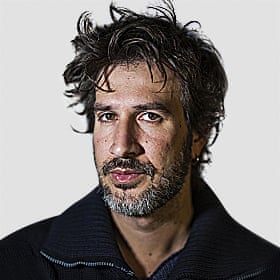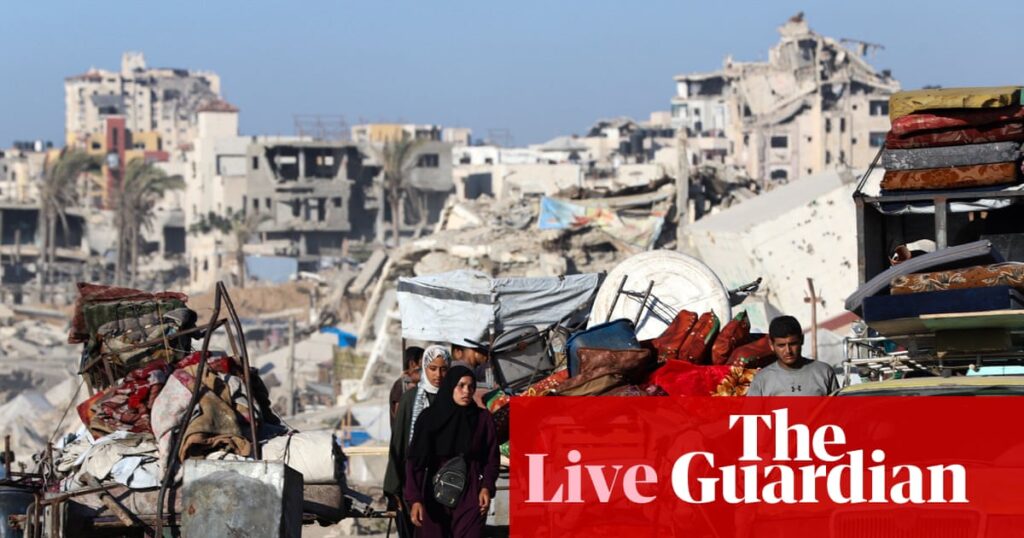Belgium to recognise Palestinian state at UN general assembly
We are restarting our live coverage of Israel’s war on Gaza. Belgium’s foreign minister, Maxime Prévot, has said his country will recognise a Palestinian state at the UN general assembly later this month, adding to international pressure on Israel after similar moves by Australia, Britain, Canada and France.
The decision comes “in light of the humanitarian tragedy unfolding in Palestine, particularly in Gaza, and in response to the violence perpetrated by Israel in violation of international law,” Prévot said in a post to social media.
Israel has become increasingly isolated on the international stage as it faces credible accusations of genocide, ethnic cleansing, war crimes and the collective punishment of the civilian population of Gaza.
Israel’s assault has flattened large parts of Gaza, killing more than 63,000 people, mostly civilians, forcing nearly all of Gaza’s more than 2 million people from their homes and causing what the UN-backed hunger monitor, the Integrated Food Security Phase Classification (IPC), described last month as a “man-made famine” in and around Gaza City. Israel is still obstructing aid into the territory, despite widespread starvation.
In a lengthy post on X describing the Belgium government’s new position, Prévot wrote:
In light of the humanitarian tragedy unfolding in Palestine, particularly in Gaza, and in response to the violence perpetrated by Israel in violation of international law, given its international obligations, including the duty to prevent any risk of genocide, Belgium had to take strong decisions to increase pressure on the Israeli government and Hamas terrorists.
This is not about sanctioning the Israeli people but about ensuring that their government respects international and humanitarian law and taking action to try to change the situation on the ground.
The recognition of Palestine would only be formalised if Hamas releases all remaining Israeli hostages kidnapped in the Hamas-led 7 October attack on southern Israel in 2023 and the militant group “no longer has any role in managing Palestine,” Prévot added.
Prévot said Belgium, a member of the European Union, would levy 12 “firm” sanctions on Israel, such as a ban on importing products from its settlements and a review of public procurement policies with Israeli companies. It will also declare Hamas leaders persona non grata in Belgium.
The minister also said two “extremist” Israeli ministers and several “violent settlers” would be designated “persona non grata” in Belgium. While he didn’t name the ministers, they are likely to be Itamar Ben-Gvir, the far right security minister in Benjamin Netanyahu’s coalition government, and Bezalel Smotrich, the far right finance minister.
Over the summer, the UK, alongside Australia, Canada, New Zealand and Norway sanctioned Ben-Gvir and Smotrich over “repeated incitements of violence against Palestinian communities” in the occupied West Bank.
Key events
Despite the overwhelming evidence to the contrary, Israeli prime minister Benjamin Netanyahu has repeatedly denied there is starvation in Gaza, and his government called the recent famine declaration by international food security experts “an outright lie”.
Gaza’s health ministry said in a post on Telegram that over the past day it recorded 13 new deaths, including three children, caused by “famine and malnutrition”.
This brings the total number of Palestinian people who have died from famine and malnutrition to 361, including 130 children.
Israel has been widely accused of using food as a political weapon and was accused of flagrantly breaking international law by collectively punishing the civilian population of Gaza by its total 11 week blockade of aid (which began in March), which was only slightly eased in response to international pressure, particularly from US senators.
Aid organisations were bringing somewhere between 500 and 600 aid trucks a day into Gaza during the ceasefire earlier this year, but now ongoing Israeli restrictions mean much less aid is being allowed into the territory and distributed.
The Israel Defense Forces (IDF) says it killed a Hamas commander and a deputy commander in its operations in the northern and central parts of the Gaza Strip in collaboration with the 99th Division and Israel’s internal intelligence agency, Shin Bet, over the last month,
In a post on X, the IDF claimed it had killed Ahmed Abu Daif, who the military said had served as deputy company commander of the Zeitoun battalion since last year.
“As part of his role, he planned, directed, and carried out dozens of ambushes and attacks against IDF forces, and in addition, he acted to recruit additional terrorists to the Hamas terror organization,” the IDF wrote.
“In one of the operations, the terrorist Talab Sadki Talab Abu Itaywi, commander of a Nukhba team who infiltrated the territory of the State of Israel on October 7, was eliminated,” it added.
Israel committing genocide in Gaza, world’s top scholars on the crime say

Lorenzo Tondo
Lorenzo Tondo is an international correspondent for the Guardian
The world’s leading genocide scholars’ association has backed a resolution stating that Israel’s actions in Gaza meet the legal definition of the crime.
Out of the International Association of Genocide Scholars’s (IAGS) 500 members, 28% took part in the vote. Of those who voted, 86% supported the resolution.
The resolution states that “Israel’s policies and actions in Gaza meet the legal definition of genocide in article II of the United Nations convention for the prevention and punishment of the crime of genocide (1948).”
The three-page resolution passed by the body calls on Israel to “immediately cease all acts that constitute genocide, war crimes and crimes against humanity against Palestinians in Gaza, including deliberate attacks against and killing of civilians including children; starvation; deprivation of humanitarian aid, water, fuel, and other items essential to the survival of the population; sexual and reproductive violence; and forced displacement of the population.”
You can read the full story here:
Israel continues deadly attacks on Gaza City as military seeks to forcibly displace Palestinian residents
Gaza’s civil defence agency spokesperson Mahmud Bassal told the Agence France-Presse news agency (AFP) that Israeli forces had struck the top floor of a residential building in southwestern Gaza City overnight, killing 10 people.
Bassal said Israeli helicopters also struck an apartment in the west of the city, killing three and injuring several others.
Israel has stepped up its destruction of Gaza City as it prepares for an assault on the shattered remains of the territory’s largest city.
Around 1 million Palestinian people, many of whom are too frail or old to keep moving, are expected to be displaced by Israel’s expanded assault in the area.
Gaza City residents are being told to move to the southern part of the territory to areas that are under frequent Israeli bombardment and are already overcrowded.
Israel declared Gaza City a “dangerous combat zone” on Friday, ending the daily humanitarian pauses that were meant to alleviate hunger and starvation there.
As my colleague William Christou notes in this story, Gaza City is in the throes of famine, a result of an Israeli blockade that despite the pauses has choked off food and medical supplies into the territory.
The Israeli prime minister, Benjamin Netanyahu, has said the assault is the best way to weaken Hamas and return hostages, a claim that is heavily disputed.

Jennifer Rankin
My colleague Jennifer Rankin has given some political context to Belgium’s decision:
Belgium’s deputy prime minister Maxime Prévot indicated that Belgium would recognise Palestine at this month’s UN general assembly, after France announced such an intention in July in the hope of creating momentum for peace. But the Belgian royal decree on recognition would not be issued until the last hostage is released.
The compromise averts a political crisis within the relatively new Belgian government.
Prévot, a centrist who is also foreign minister, had threatened to block government business if there was no agreement on recognition, or taking a stricter tone towards Israel.
Only last week prime minister Bart de Wever, a Flemish nationalist, described recognition as “counterproductive” and “pointless” without the full disarmament of Hamas.
The Palestinian foreign ministry has said it welcomes Belgium’s announcement that it will recognise Palestinian statehood.
In a statement on X, the ministry said it considered the move “to be in line with international law and United Nations resolutions, and protective of the two-state solution and supportive of achieving peace”.
The statement added:
The ministry calls on the countries that have not yet recognized the state of Palestine to quickly take the initiative for this recognition, and to intensify practical efforts to stop the crimes of genocide, displacement, starvation, and annexation, and to open a real political path to resolve the conflict and end the Israeli occupation of the land of the State of Palestine.
What will recognising Palestine mean in practice?
The Guardian’s political correspondent Eleni Courea has done an explainer with a section looking at what recognising Palestine would look in practice. Here is an extract:
Recognition is a symbolic step but one that would infuriate the Israeli government, which argues that it would encourage Hamas and reward terrorism.
It is in effect a formal, political acknowledgment of Palestinian self-determination – without the need to engage in thorny practicalities such as the location of its borders or capital city.
It also allows the establishment of full diplomatic relations that would result in a Palestinian ambassador (rather than a head of mission) being stationed in London and a British ambassador in Palestine. Advocates say it is a way of kickstarting a political process towards an eventual two-state solution.
Out of the 193 UN member states, about 140 already recognise Palestine as a state. These include China, India and Russia, as well as a majority of European countries such as Cyprus, Ireland, Norway, Spain and Sweden.
Belgium to recognise Palestinian state at UN general assembly
We are restarting our live coverage of Israel’s war on Gaza. Belgium’s foreign minister, Maxime Prévot, has said his country will recognise a Palestinian state at the UN general assembly later this month, adding to international pressure on Israel after similar moves by Australia, Britain, Canada and France.
The decision comes “in light of the humanitarian tragedy unfolding in Palestine, particularly in Gaza, and in response to the violence perpetrated by Israel in violation of international law,” Prévot said in a post to social media.
Israel has become increasingly isolated on the international stage as it faces credible accusations of genocide, ethnic cleansing, war crimes and the collective punishment of the civilian population of Gaza.
Israel’s assault has flattened large parts of Gaza, killing more than 63,000 people, mostly civilians, forcing nearly all of Gaza’s more than 2 million people from their homes and causing what the UN-backed hunger monitor, the Integrated Food Security Phase Classification (IPC), described last month as a “man-made famine” in and around Gaza City. Israel is still obstructing aid into the territory, despite widespread starvation.
In a lengthy post on X describing the Belgium government’s new position, Prévot wrote:
In light of the humanitarian tragedy unfolding in Palestine, particularly in Gaza, and in response to the violence perpetrated by Israel in violation of international law, given its international obligations, including the duty to prevent any risk of genocide, Belgium had to take strong decisions to increase pressure on the Israeli government and Hamas terrorists.
This is not about sanctioning the Israeli people but about ensuring that their government respects international and humanitarian law and taking action to try to change the situation on the ground.
The recognition of Palestine would only be formalised if Hamas releases all remaining Israeli hostages kidnapped in the Hamas-led 7 October attack on southern Israel in 2023 and the militant group “no longer has any role in managing Palestine,” Prévot added.
Prévot said Belgium, a member of the European Union, would levy 12 “firm” sanctions on Israel, such as a ban on importing products from its settlements and a review of public procurement policies with Israeli companies. It will also declare Hamas leaders persona non grata in Belgium.
The minister also said two “extremist” Israeli ministers and several “violent settlers” would be designated “persona non grata” in Belgium. While he didn’t name the ministers, they are likely to be Itamar Ben-Gvir, the far right security minister in Benjamin Netanyahu’s coalition government, and Bezalel Smotrich, the far right finance minister.
Over the summer, the UK, alongside Australia, Canada, New Zealand and Norway sanctioned Ben-Gvir and Smotrich over “repeated incitements of violence against Palestinian communities” in the occupied West Bank.

